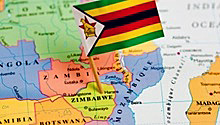PBS: Escaping Eritrea … [Read More...] about ካብ ውሽጢ ቤት ማእሰርታት ኤርትራ
Zimbabwe: At 35, it’s suffer continue
By THELMA CHIKWANHA, POLITICAL EDITOR • 12 APRIL 2015, D aily News (Zimbabwe)
HARARE – Zimbabweans have savaged the ruinous policies of President Robert Mugabe and his ruling Zanu PF party, saying these have reduced the country to a basket case where chaotic urban street vending has now become professionalised and where there is very little to celebrate on Independence Day next Saturday.
Both analysts and ordinary Zimbabweans who spoke to the Daily News on Sunday yesterday said there had been no tangible “democracy dividends”, particularly on the economic front, since the country attained its independence from Britain on April 18, 1980 — despite the hope of a better life back then.
At 35, it’s suffer continue [for all] intents and purposes, except for a few privileged individuals, as many Zimbabweans were bogged down in terrible survival struggles.
“Independence means enjoying basic freedoms — freedom of speech, movement, association, enjoying and participating in economic opportunities in your country, equality and prosperity.
“All these are just a preserve of a few people with links to Zanu PF and those in power. For most Zimbabweans, independence now means very little. We removed white oppressors and replaced them with our own oppressors.
“Independence should also mean Zimbabweans being free to find employment of their choice in Zimbabwe and not crossing borders illegally to seek manual jobs in other countries where they get killed in xenophobic attacks,” Saungweme said.
National Vendors Union Chairperson Sten Zvorwadza said he wondered why some political leaders had the temerity to stand up and say they liberated Zimbabwe when many people were suffering terribly, while vendors were being threatened with eviction.
“Vending is the only enterprise that is supporting livelihoods of the majority these days but when they are denied their right which is espoused in the Constitution in section 13(1) (a) it is like removing oxygen for a person who needs it,” Zvorwadza said.
“It points to the fact that the liberation war was not fought for the generality of Zimbabweans, but for a minority group leading the country selfishly,” he said.
An unemployed graduate, who requested to be identified by his first name only, Tonderai — and who has been walking the streets since he completed his business management degree seven years ago — said his mood was so low at the moment that he sometimes also felt like asking the country’s leaders to “hand the country back to the colonisers” as they had done “such a bad job of managing our independence”.
“What is the meaning of this independence beyond those few political elites and their cronies who are ripping off and raping this country?
“Do our leaders even know that many young Zimbabweans who are highly educated are now either vegetable vendors or risking being eaten by crocodiles in the Limpopo River as they illegally cross into South Africa where they also face terrible xenophobia?
“This is the reason why I sometimes feel it would be better if our so-called liberators would just hand back the country to those who had colonised Zimbabwe before some of us were born so that our generation can fight for better and real freedom, where there are opportunities for all, and not just politicians and their connections,” Tonderai said.
But businessman and music promoter Farai Shambare said although the country was facing many problems, especially those related to the prevailing dire economic conditions, it was also important to celebrate independence day.
“This does not mean that there is much to celebrate at the moment, because there is no money and no peace of mind,” he said.
These sentiments came as News24 reported yesterday that the government-initiated “#1980SoFarSoGood”, which was supposed to be a feel good hash tag for Zimbabweans to adopt ahead of the 35th anniversary of independence next Saturday, came under a barrage of attack.
Many Zimbabweans had gleefully savaged the hash tag on Twitter, insisting that life in Zimbabwe under Mugabe has not been good at all in the three and a half decades since he took over at independence.
Users posted pictures of the empty supermarket shelves and wads of worthless Zimbabwe dollar notes that were seen in 2007-8, at the peak of Zimbabwe’s economic crisis.
There were also photos of hungry Zimbabwean children picking up grain from the side of the road, and of burning homes at Manzou Farm in Mazowe, which was cleared of villagers by Zimbabwe’s controversial First Lady Grace Mugabe earlier this year to make way for her game reserve.
User @kudzii91 wrote: “I couldn’t find a job after I finished my degree, as is the same with my varsity mates. #SoFarSoGood”.
“No clean water. #SoFarSoGood,” user @senor_foster said.
@NickkTitan tweeted: #SoFarSoGood …+80% unemployment….we don’t even have a currency to call our own anymore…so far so good? Don’t insult our intelligence.”
Another user @RasMankindDiv tweeted: “#SoFarSoGood — I can’t handle that. An insult to the people of Zimbabwe who have weathered severe testing economic hurricanes & turmoil.”
Mugabe, 91, is the only leader that long-suffering Zimbabweans have known since independence in 1980.
While many Zimbabweans value the role he played in the war against white minority rule, as well as his emphasis on education in his early days in power, there is also widespread anger over corruption and the way in which his government has crushed dissent, particularly since the formation of the opposition Movement for Democratic Change in 1999.
